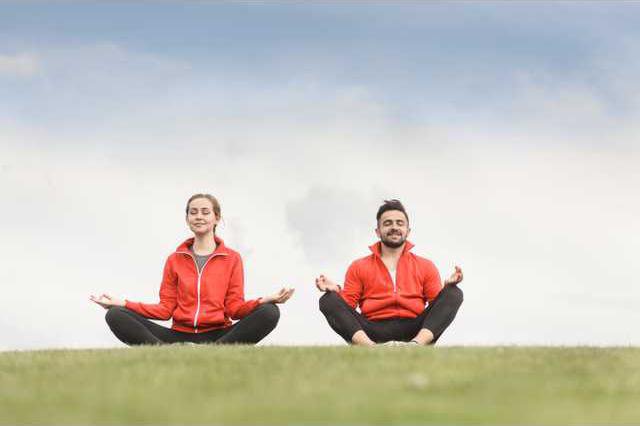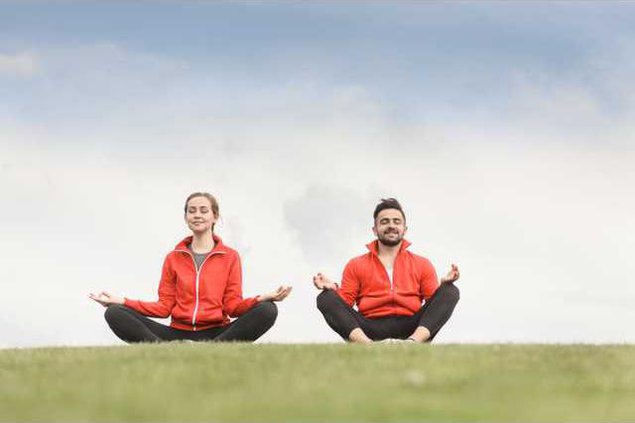Our fast-paced modern culture leaves little room for quiet moments. We often dismiss stillness and solitude as a waste of time. However, as weve gotten busier, weve also gotten sicker. The main culprit: stress. The best way to help: daily meditation.
The greatest health issue of our day is the chronic over-stimulation of the fight or flight response in our bodies, said Steven Nibley, a local meditation expert.
Americans are plagued by preventable conditions such as hypertension, headaches, insomnia, heart disease, stroke, cancer, diabetes and more, all of which are brought on or exacerbated by stress.
Forty-three percent of all adults suffer from adverse health effects from stress and seventy-five to 90% of all doctors office visits are for stress-related ailments and complaints, according to WebMD. Americans spend more than $300 billion annually on stress.
Modern medicine and ancient Eastern wisdom agree a simple daily meditation practice 10 to 20 minutes of sitting quietly to take some deep breaths offers a powerful way to protect and heal our bodies.
Here are three incredible ways meditation can save your life.
1. Reduce and manage stress
When we encounter stress, whether its a bad day at work, the kids fighting in the car or a bear chasing us down a hiking trail, our bodies respond by releasing certain hormones. Designed to protect us from danger, cortisol, epinephrine and norepinephrine increase heart rate, blood pressure, breathing rate and muscle energy output.
Though handy if actually being chased by a bear, problems arise when we continually activate fight or flight with a high-stress lifestyle. Constant exposure to these hormones damages the body.
Herbert Benson, a physician at Harvard Medical School, conducted some of the first influential Western meditation research in the 1960s. He was the first to use the term relaxation response, essentially the opposite of fight or flight. This response in the body, activated by deep breathing, relaxes muscles, slows heart rate, decreases blood pressure and releases healing hormones, such as DHEA, melatonin, serotonin and human growth hormone.
One deep breath activates the response, with full benefits after as few as 20 breaths.
2. Bolster immunity
A daily meditation practice improves the function of the immune system. As mentioned above, activating the relaxation response releases healing hormones, which in turn support immunity. The body is better prepared to fight infection, inflammation, aging and even protect against damaging conditions such as cancer and Alzheimers.
An increase in DHEA levels in the blood corresponds to a 48% reduction in mortality due to cardiovascular disease and a 36% reduction in mortality overall, Nibley said.
Melatonin improves quality of sleep, mood, sexual maturation, reproduction and anti-aging mechanisms. Serotonin improves brain function, and human growth hormone improves muscle tone, bone strength and skin health.
Deepak Chopra, meditation expert and author of many best-selling books, said meditation can lower our biological age by quieting the mind, which then quiets the body, and the less turbulent the body is, the more the self-repairing healing mechanisms get amplified.
3. Increase emotional well-being
All mens miseries derive from not being able to sit in a quiet room alone, said Blasie Pascal, a French mathematician, physicist and inventor.
Meditation relaxes our bodies, but it also calms our minds. With a calm mind, we are better equipped to see things clearly, make correct choices and choose appropriate responses to stress. Meditation also offers time for reflection and introspection, so we better know who we are and why we do what we do.
Its not just a feeling, however. Its anatomy.
A study reported in the Harvard Gazette in January 2011 found that three major physiological changes in the brain occur from regular meditation. First, there is a thickening of the cerebral cortex in areas associated with attention and emotional integration. Second, an increase in gray matter density in the hippocampus helps increase self-awareness, compassion and introspection. Third, a decrease in density in the amygdala, also called the lower brain, can reduce anxiety and stress.
By practicing meditation, we can play an active role in changing the brain and can increase our well-being and quality of life," said Britta Holzel, one of the scientists involved in the study.
How to meditate
Integrate meditation into your daily routine. Practice first thing in the morning, on your lunch break or just before bed or anytime you can. Meditation is not complicated and requires no fancy equipment, clothing or specialized training. Follow these easy steps, and youll reap all the physical, mental and emotional benefits of meditation.
1. Find a quiet place, such as your bedroom, back porch or even your car.
2. Sit comfortably, with a tall spine and shoulders relaxed, hands resting however you like.
3. Close your eyes, and relax your jaw and face muscles.
4. Take slow, long breaths in and out the nose.
5. Keep breathing and relaxing for 10 to 20 minutes. When short on time, relax for a count of 20 breaths.
6. Allow your mind to calm as you focus on breathing. When thoughts come, briefly acknowledge them, and then come back to your breath.
The greatest health issue of our day is the chronic over-stimulation of the fight or flight response in our bodies, said Steven Nibley, a local meditation expert.
Americans are plagued by preventable conditions such as hypertension, headaches, insomnia, heart disease, stroke, cancer, diabetes and more, all of which are brought on or exacerbated by stress.
Forty-three percent of all adults suffer from adverse health effects from stress and seventy-five to 90% of all doctors office visits are for stress-related ailments and complaints, according to WebMD. Americans spend more than $300 billion annually on stress.
Modern medicine and ancient Eastern wisdom agree a simple daily meditation practice 10 to 20 minutes of sitting quietly to take some deep breaths offers a powerful way to protect and heal our bodies.
Here are three incredible ways meditation can save your life.
1. Reduce and manage stress
When we encounter stress, whether its a bad day at work, the kids fighting in the car or a bear chasing us down a hiking trail, our bodies respond by releasing certain hormones. Designed to protect us from danger, cortisol, epinephrine and norepinephrine increase heart rate, blood pressure, breathing rate and muscle energy output.
Though handy if actually being chased by a bear, problems arise when we continually activate fight or flight with a high-stress lifestyle. Constant exposure to these hormones damages the body.
Herbert Benson, a physician at Harvard Medical School, conducted some of the first influential Western meditation research in the 1960s. He was the first to use the term relaxation response, essentially the opposite of fight or flight. This response in the body, activated by deep breathing, relaxes muscles, slows heart rate, decreases blood pressure and releases healing hormones, such as DHEA, melatonin, serotonin and human growth hormone.
One deep breath activates the response, with full benefits after as few as 20 breaths.
2. Bolster immunity
A daily meditation practice improves the function of the immune system. As mentioned above, activating the relaxation response releases healing hormones, which in turn support immunity. The body is better prepared to fight infection, inflammation, aging and even protect against damaging conditions such as cancer and Alzheimers.
An increase in DHEA levels in the blood corresponds to a 48% reduction in mortality due to cardiovascular disease and a 36% reduction in mortality overall, Nibley said.
Melatonin improves quality of sleep, mood, sexual maturation, reproduction and anti-aging mechanisms. Serotonin improves brain function, and human growth hormone improves muscle tone, bone strength and skin health.
Deepak Chopra, meditation expert and author of many best-selling books, said meditation can lower our biological age by quieting the mind, which then quiets the body, and the less turbulent the body is, the more the self-repairing healing mechanisms get amplified.
3. Increase emotional well-being
All mens miseries derive from not being able to sit in a quiet room alone, said Blasie Pascal, a French mathematician, physicist and inventor.
Meditation relaxes our bodies, but it also calms our minds. With a calm mind, we are better equipped to see things clearly, make correct choices and choose appropriate responses to stress. Meditation also offers time for reflection and introspection, so we better know who we are and why we do what we do.
Its not just a feeling, however. Its anatomy.
A study reported in the Harvard Gazette in January 2011 found that three major physiological changes in the brain occur from regular meditation. First, there is a thickening of the cerebral cortex in areas associated with attention and emotional integration. Second, an increase in gray matter density in the hippocampus helps increase self-awareness, compassion and introspection. Third, a decrease in density in the amygdala, also called the lower brain, can reduce anxiety and stress.
By practicing meditation, we can play an active role in changing the brain and can increase our well-being and quality of life," said Britta Holzel, one of the scientists involved in the study.
How to meditate
Integrate meditation into your daily routine. Practice first thing in the morning, on your lunch break or just before bed or anytime you can. Meditation is not complicated and requires no fancy equipment, clothing or specialized training. Follow these easy steps, and youll reap all the physical, mental and emotional benefits of meditation.
1. Find a quiet place, such as your bedroom, back porch or even your car.
2. Sit comfortably, with a tall spine and shoulders relaxed, hands resting however you like.
3. Close your eyes, and relax your jaw and face muscles.
4. Take slow, long breaths in and out the nose.
5. Keep breathing and relaxing for 10 to 20 minutes. When short on time, relax for a count of 20 breaths.
6. Allow your mind to calm as you focus on breathing. When thoughts come, briefly acknowledge them, and then come back to your breath.





